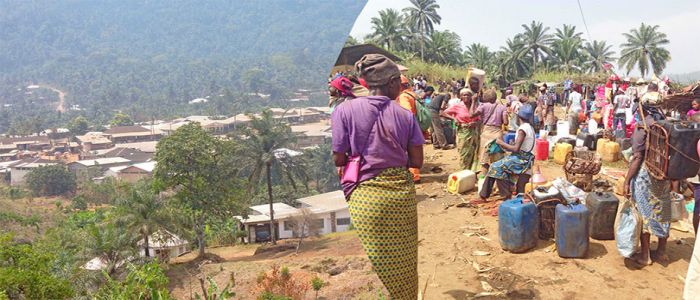
Despite palm oil value, extreme climate variability is imposing an adverse impact on yields.
Have you ever toured the Jamaican palm jungle or simply nursed the feeling of visiting the Paradise Island? If you have not, then the alternative is here! Make a trip to Widikum, the land of palm oil. You will enjoy one of the most elegant landscapes, gorgeously clothed in bright green palms that buzz and dance in the winds from dawn to dusk. They may not be the Sabal palms of Florida, the Royal Palms of Cuba or the Fan palms of Mexico. But, they are as natural as nature and as old as the dinosaur. The beauty, the solace and the splendour!
Did you know that palm oil is gold to over 90 % of the 30,000 inhabitants of Widikum-Boffe municipality? Indeed, nearly every family depends on it for income, education, health and leisure. The production and marketing is mainly undertaken by women and children, though the money belongs to the fathers, head of the family. According to research, natural palm trees constitute more than 60% of the natural vegetation in this council area. Traders attracted from cosmopolitan Bamenda stream to Widikum every market day (Mbon) where they buy in large scale at “give away” prices due to lack of a concensual bargaining front.
It is said the market is flooded by about 600 to 2,000 people during the off and the peak seasons, March – July. At the height of the season, about 200,000 litres is traded weekly with a litre sold at between 300 to 450 FCFA. Palm oil tax constitutes a major income source for Widikum-Boffe council. Generally referred to as ‘ Meta oil’ , Widikum oil is considered superior to all the others due to its shiny red colour, taste and texture which makes it largely suitable for various menus, especially indigenous dishes from both the forest and grassland regions of Cameroon.
Despite its importance, the Widikum oil sector faces enormous human and natural challenges, which include the none organization of value chain, inadequate farm-to-market roads, persistent artisan production techniques, poor benefit sharing mechanism and aging of the natural palm trees. Because of age, the amount of oil produced per palm nut is said to have steadily dropped due to drastic fall in natural germination, leading to increase in the cost of labour, amount of palm nuts harvested and significant drop in income. Again, extreme climate variability is imposing an adverse impact on yields. Increasing rainfall, extreme winds and very cold temperatures cause changes in the gestation period, resulting in a fall in production.
There is need therefore for the Government and partners to reinforce best practice campaigns for new oil palm schemes, identify and develop most suitable areas for improved pal...
Cet article complet est réservé aux abonnés
Déjà abonné ? Identifiez-vous >
Accédez en illimité à Cameroon Tribune Digital à partir de 26250 FCFA
Je M'abonne1 minute suffit pour vous abonner à Cameroon Tribune Digital !
- Votre numéro spécial cameroon-tribune en version numérique
- Des encarts
- Des appels d'offres exclusives
- D'avant-première (accès 24h avant la publication)
- Des éditions consultables sur tous supports (smartphone, tablettes, PC)











Commentaires